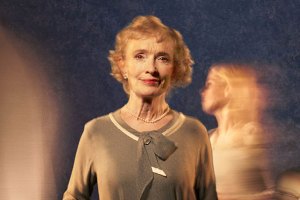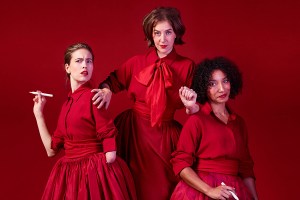
Unless you’re in one of those rare Scrabble-playing, round-the-piano-singing, suspiciously harmonious families, you’ll be all too familiar with the truth that makes Dodie Smith’s 1938 play so joyously and painfully relatable. Families are simmering pots of emotion, constantly on the brink of boiling over. And family gatherings? Well, they’ll crank the heat right up.
The Randolph family pot is a hefty one – four generations gathering at their ancestral home on the cusp of the Second World War for Dora and Charles’s golden wedding anniversary. And it is a pot most certainly on the bubble. The deaths of two of the couple’s children hang in the air. The four remaining siblings arrive home dragging their individual baggage (most notably Cynthia, who has been mysteriously absent for seven years). There are in-laws poised to needle and meddle, children to wrangle and protect. And Dora’s companion Fenny, a peer to her children, with a personal crisis brewing.
Unpacking all of this is quite the balancing act. But Emily Burns’s production manages it beautifully. She’s given a gift in Smith’s dialogue, which masterfully observes every corner of family life, and tempers nostalgia and heartache with a steady stream of zingers. And Burns runs with it – her warm, expansive direction creating a family that is utterly convincing, and giving an exploration of life and the passage of time that is moving but never maudlin.
The cast are as watertight as they come and I’d happily delve into every individual performance but in the interest of space I’ll begrudgingly pick a few. Lindsay Duncan is fantastic as matriarch Dora. She’s infuriating (incessantly sending her family off on ‘little jobs’ while complaining that they’re never together) but never enough to distract us from the love that radiates from her. Her desperate longing for her children’s happiness, and the deep comfort she finds in her long marriage to Charles (played with restraint and warmth by Malcolm Sinclair). Meanwhile, her constant exchanging of barbs with Aunt Belle, an equally winning Kate Fahy, give some of the biggest laughs of the night. Noting her rival’s attempts to appear younger with heavy make-up, Dora quips “It must be very worrying to take a face like that out in the rain.”
The four siblings are strong individually, especially Jo Herbert as straight-talking career woman Hilda, but together they’re magic. The sibling shorthand, the catty retorts and unbreakable loyalty. The history they weave together is one of the show’s most satisfying components. And mentions must also go to Bessie Carter as Fenny, whose unravelling is kept so expertly (just) below the surface, and to young Felix Tandon as wayward schoolboy Bill.
And there is an extra cast member: the house. A place where the past asserts itself. Where memories have settled like an unscrubbable film of dust over everything. And Frankie Bradshaw’s revolving design makes sure we know it, in the nursery’s peeling walls, and the shadows cast by firelight, which take Charles back to his infancy.
Critics at the time noted that the play was light on plot. And it’s certainly not a nail biter. There are a few more urgent storylines driving things — a romance, the reunion of Dora and Cynthia – but for the most part the action is a series of familial vignettes that ask us to reflect on life’s big questions. Why do we still flock to our families, in spite of everything they put us through? What does it mean to love? And to age? How should we be spending our time?
Yes it’s not a plot in the traditional sense of the word. But then, what better plot is there than this bewildering, wondrous life?
















